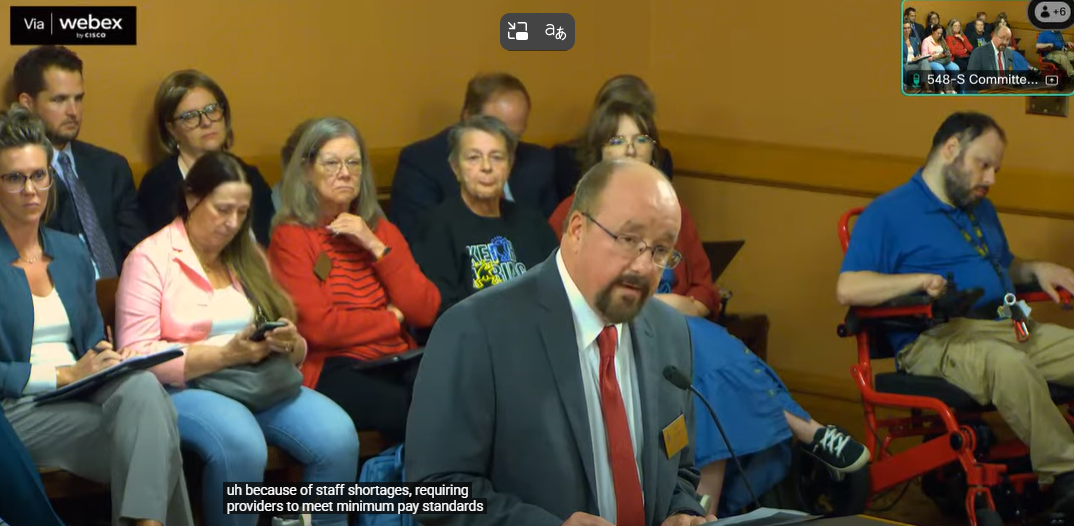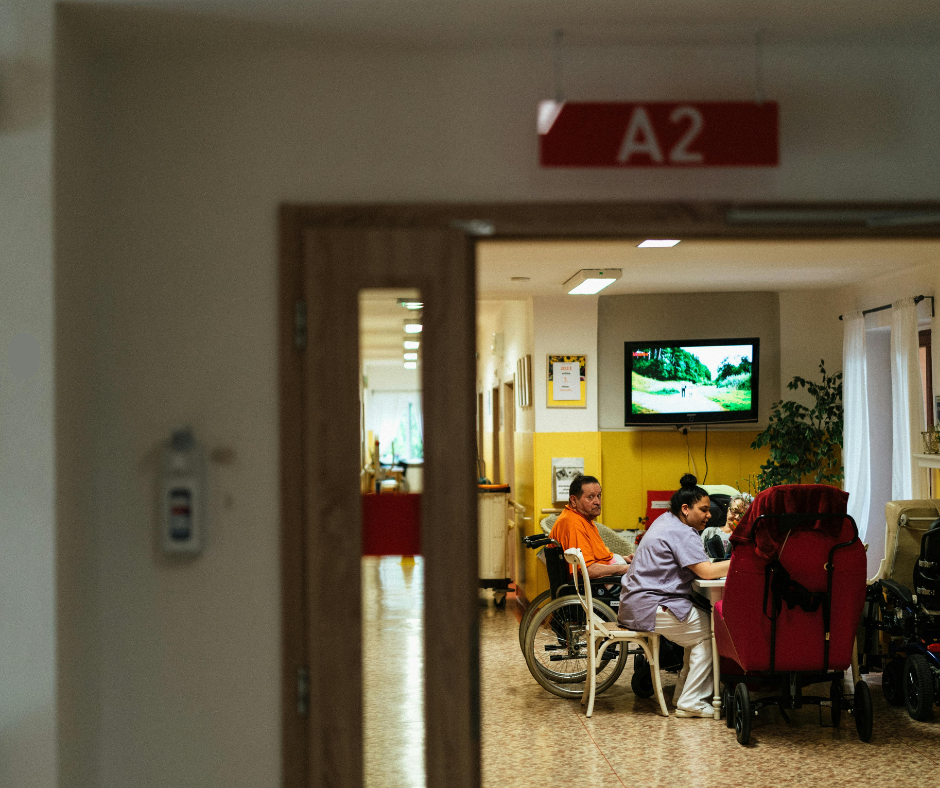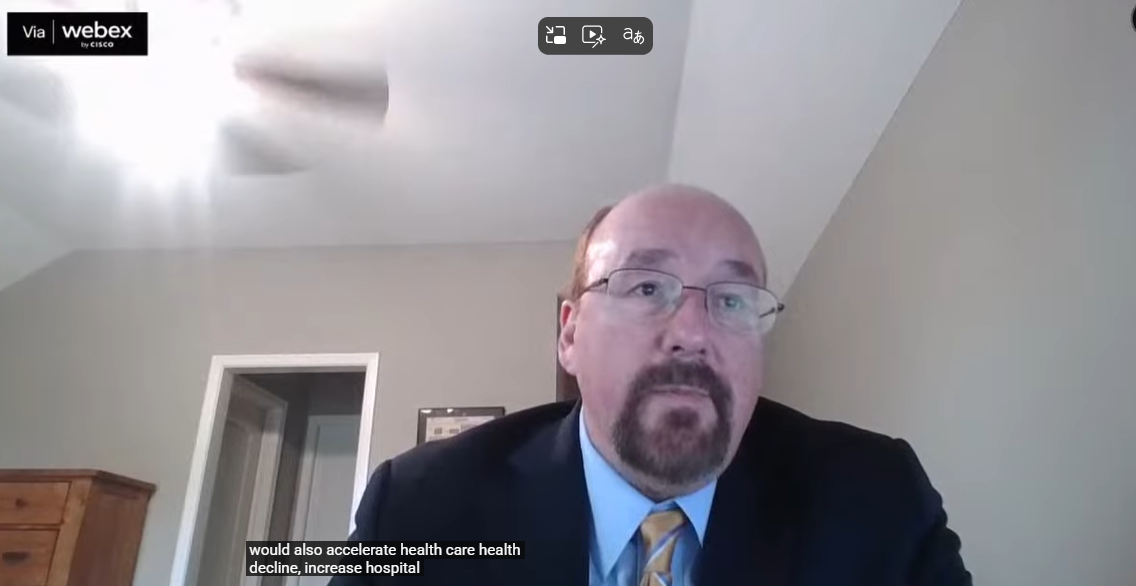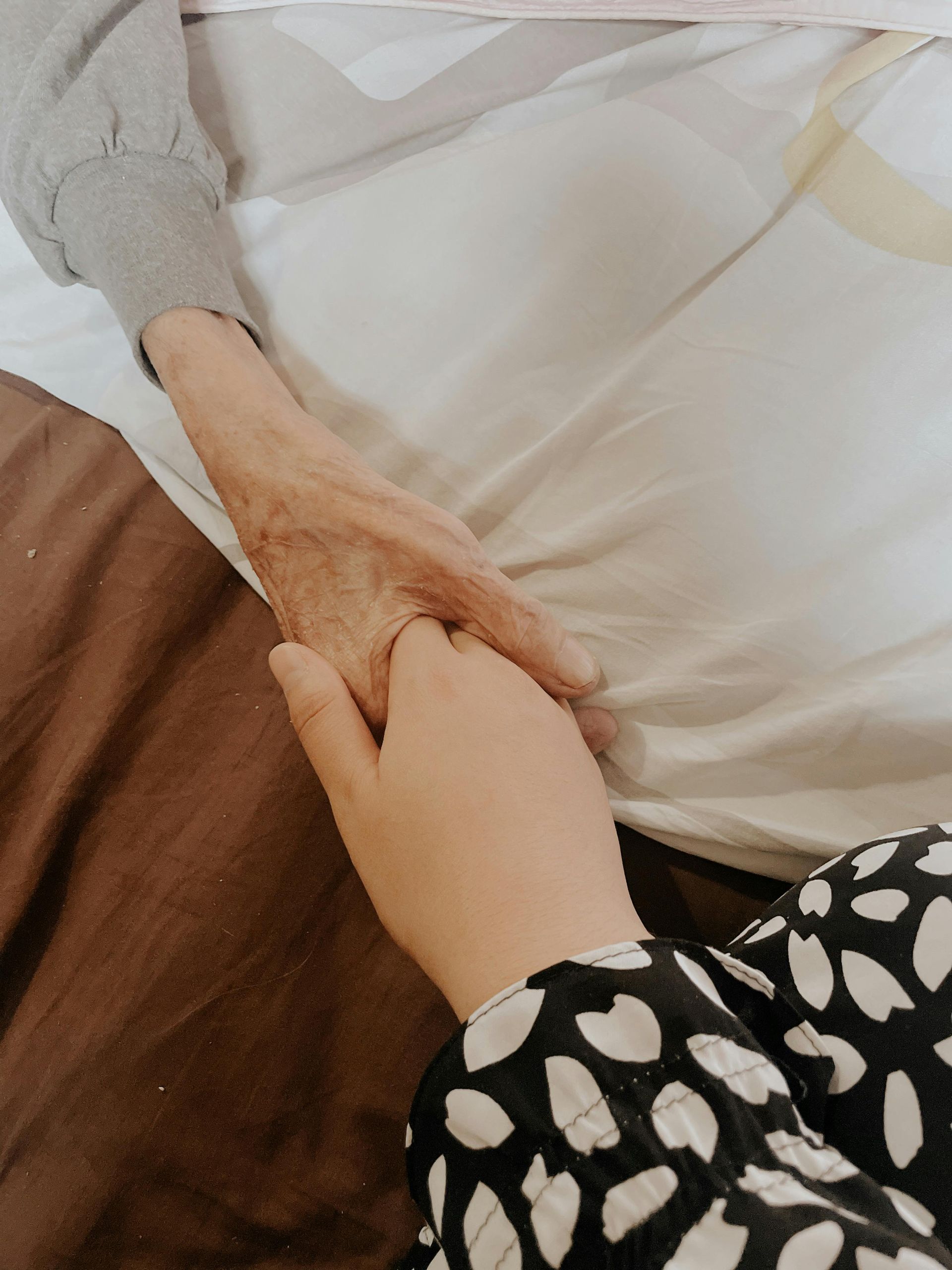Blog

In 2025, KABC marked a major milestone: 50 years of advocating for the safety, dignity, and rights of older Kansans. Our newly released 2025 Impact Report reflects a year of meaningful progress, powerful advocacy, and deep community connection. This past year, KABC assisted hundreds of residents and families through direct advocacy, strengthened long-term care oversight through legislative work, and expanded access to information with the launch of a statewide senior resource directory in partnership with KDADS. We also amplified resident voices through media coverage, testified before legislative committees, and successfully countered efforts that would have weakened long-term care safety standards. As part of our 50th anniversary, we brought advocacy into the community with new events like Revving Up Joy, a classic car show connecting residents and neighbors, and a public screening of No Country for Old People , sparking critical conversations about the realities of long-term care in America. None of this work is possible without the support of our donors, partners, board members, and volunteers. Your commitment fuels our mission and helps ensure older Kansans are seen, heard, and protected. Read our full 2025 Impact Report here .

A recent KAKE News report highlights how Kansas’s severe shortage of state nursing home inspectors is putting residents at serious risk. Families say long delays in inspections allow neglect to continue unchecked, sometimes with devastating consequences. One of the most troubling stories comes from Jennifer Hernandez, whose aunt lived at Santa Marta in Olathe. Santa Marta advertises itself as "Luxury Senior Living in Johnson County, KS". A camera Hernandez installed in her aunt’s room recorded her aunt lying on the floor after falling out of bed. Nearly an hour passed before anyone checked on her. In the video, you can see her aunt struggling to get up on her own. Hernandez placed the camera because she was already worried about her aunt’s care. Sadly, the fall wasn’t the only issue. Her aunt was also found in dirty clothes, had unexplained bruising, and developed an eye infection. Hernandez repeatedly begged the facility to follow her aunt’s care plan, but she was ignored or dismissed. The family turned to the Long-Term Care Ombudsman’s Office, which can request an investigation by the Kansas Department for Aging and Disability Services (KDADS) state surveyors at the resident's request. These investigations can lead to fines, penalties, or corrective action. In Kansas, complaint investigations can take more than a year to start. This is especially alarming because surveyors are one of the only independent sources of information the public has about nursing home quality. Their reports are often the only transparent, verifiable records families can rely on when choosing a facility. Surveyors are also one of the few entities with the authority to hold nursing homes accountable when care breaks down. And Kansas is falling far behind. The state has 303 federally certified nursing facilities, which must be inspected at least every 15.9 months, with a national average of 12 months. Kansas is currently averaging 19.9 months between these mandatory inspections. In Hernandez’s case, an ombudsman even emailed KDADS, warning that staff had tampered with the camera and that the resident was at severe risk. A state inspector never came. Her aunt later fell again, broke her pelvis, and died days later in severe pain. While the state’s inspection delays are a major part of the problem, the facilities themselves also bear responsibility. Too often, homes put profits over people, cutting corners on staffing, training, and basic care. But it becomes even harder to push for stronger regulations when facilities aren’t being held accountable for meeting the baseline requirements already in place. When the “ceiling” of what a facility does is the bare minimum required by federal and state governments, residents are the ones who suffer. Kansas’s inspection workforce is stretched far too thin to enforce even the most basic standards. In July, KDADS had 51 surveyor positions — 28 of them empty. The agency later reduced the total positions to 36 and raised salaries, but still has 13 vacancies. That leaves just 23 surveyors responsible for inspecting and investigating more than 300 nursing homes statewide. Families, advocates, and ombudsmen agree: until Kansas fully staffs and supports its survey team, neglect will go unnoticed, problems will go uncorrected, and residents will remain in danger.

This is a special blog post provided by Jami Boone, Adult Care Homes Quality Program Manager, Kansas Department for Aging and Disability Services Moving into a nursing home is often seen as a loss—the loss of independence, familiar routines, and personal choice. But in Kansas, the PEAK program is changing that story. Through this pay-for-performance initiative, administered by Kansas State University and the Kansas Department for Aging and Disability Services (KDADS), nursing homes are putting residents at the center of every decision and creating communities where people feel truly at home. PEAK encourages nursing homes to adopt person-directed care, giving residents control over their daily lives. Participating homes can earn financial incentives—ranging from $0.50 to $3.00 per bed, per day—based on how deeply they implement these practices. But the true value of PEAK isn’t in the funding—it’s in transforming life inside the home, fostering dignity, choice, and joy for residents. Imagine moving into a new home where you can bring your favorite bedding, chair, and treasured belongings. You don’t have to give up who you are or what you love. Instead, you gain new opportunities, new friendships, and new family connections, along with access to activities you may have thought were out of reach. At the same time, you maintain your existing community roles, personal routines, and comforts, blending familiarity with new possibilities. Residents in PEAK homes have the freedom to decide how their living space looks and feels, what, where, and when they eat, when they wake up or go to bed, and even which risks they are willing to take. That sense of control and individuality is central to maintaining dignity, identity, and joy, making daily life meaningful and fulfilling. The benefits extend beyond residents. When staff are empowered to build deep, personal relationships with residents, they stop seeing their work as a job and start seeing it as an extension of home. Staff get to know the people they care for so well that they notice even the smallest changes—whether it’s a favorite meal left untouched or a subtle shift in mood. This heightened awareness allows potential issues to be addressed sooner, improving healing and raising the overall level of care. The bonds between staff and residents not only create a more home-like environment but also foster staff satisfaction, because when work feels like home, people show up fully, care deeply, and make every interaction meaningful. This mutual respect and compassion ripple outward, creating an atmosphere that families can feel the moment they walk through the door. PEAK homes offer families additional peace of mind, ensuring that when a loved one moves into care, they enter a place that honors their individuality, values their voice, and supports their physical, emotional, and spiritual well-being. Kansas continues to lead by example, showing that when dignity and choice are prioritized, everyone benefits. PEAK homes aren’t just places to live—they’re places to thrive. To find a PEAK participating nursing home in your area, visit: https://www.kdads.ks.gov/partners-providers/nursing-facilities-adult-care-home-program/peak-person-centered-care . For more information about the PEAK program, contact Jami Boone , Adult Care Homes Quality Program Manager, KDADS, at jami.boone@ks.gov or 785-296-0010 . Note from KABC : While KABC supports efforts that aim to improve quality of life and person-centered care in Kansas nursing homes, participation in the PEAK program does not necessarily indicate that a facility is consistently meeting those standards in practice. Financial incentives or program participation alone do not guarantee that residents are receiving the care, dignity, and respect they deserve. KABC encourages families and residents to review a variety of quality measures—including inspection reports, staffing levels, and complaint histories—when evaluating long-term care options.

On Monday, October 13th, Dan Goodman, Executive Director of Kansas Advocates for Better Care (KABC), delivered testimony before the Robert G. Bethell Joint Committee on Home & Community Based Services & KanCare Oversight. His remarks focused on the urgent need to strengthen Kansas’ long-term care system through sustainable funding and workforce investments. Goodman urged legislators to provide additional funding for the Home and Community-Based Services (HCBS) Frail Elderly waiver , noting projected shortfalls of $27 million in FY26 and $70 million in FY27. Without intervention, hundreds of older Kansans could face placement on a waitlist as early as this fall—delaying access to critical in-home services and increasing the risk of premature institutionalization. He also highlighted the need to support and stabilize the state’s long-term care workforce by exploring innovative approaches used in other states. For example, New Mexico’s Competitive Pay for Professionals program has helped attract and retain workers by linking higher wages to improved reimbursement rates and accountability measures. Goodman suggested Kansas consider similar models to strengthen its caregiving workforce and ensure providers can offer competitive pay. KABC remains committed to advocating for policies that promote quality care, protect older adults, and sustain a strong, well-supported caregiving system across Kansas. Read KABC’s full testimony here: View Testimony (PDF) Watch a full recording of the committee here: YouTube Link

On October 1st and 2nd, the 2025 Special Committee on Health and Social Services met, with the first day devoted to nursing home surveying and credentialing. The joint committee of both House and Senate members heard from the Kansas Department for Aging and Disability Services (KDADS), the Long-Term Care Ombudsman, industry representatives from Kansas and out of state, administrators, and contractors. Notably absent were the voices of consumers, their family members, and facility staff , the people most affected by long-term care policy. The committee heard information about: Survey Backlogs and Staffing Challenges KDADS contracts with the federal government to inspect adult care homes for health and safety compliance. KDADS has struggled for years to meet federal requirements, due in large part to recruiting and retaining nurse surveyor positions. More than half of the 60 approved positions were vacant earlier this year. As a result, Kansas currently averages 19.9 months between nursing home inspections , far beyond the federal requirement of 12-15.9 months. With just over 300 federally licensed facilities in the state, timely inspections are critical to protecting residents. To address this, KDADS eliminated 15 vacant positions and raised starting pay: up to $60,000 for multidisciplinary surveyors and $67,000 for RNs . The agency is also considering incentives to encourage more RNs to work as surveyors. Kansas has one of the highest rates of the most serious deficiencies, known as Immediate Jeopardy (IJ) deficiencies, in the nation , citations for situations where resident health and safety are at serious risk. The committee explored the possibility of privatizing the survey process. Resident Rights at Risk Testimony also revealed troubling practices in some nursing homes, including charging residents $200–$300 per month in “pharmacy provider” or “medication set-up” fees if they choose to use an outside pharmacy. This practice undermines residents’ right to choose their own providers and unfairly penalizes private-pay residents, already shouldering an average of $7,000–$8,000 per month in nursing home costs. Involuntary Discharges and the Ombudsman’s Recommendation The Long-Term Care Ombudsman urged lawmakers to expand discharge reporting requirements. As she noted: “Federal regulations require a notice to be sent to our office for a facility-initiated transfer (involuntary discharge) in federally licensed nursing homes, but that is not the case for state licensed homes, assisted livings, home pluses and residential health care facilities. With the help of our office, we can often help resolve the reason for the discharge notice to prevent a resident transfer or support the resident to ensure a transition occurs safely.” The committee heard concerns from representatives of the nursing home industry and decided to delay making a recommendation on this issue, noting that additional information is needed. KABC has advocated for not only strengthening the reporting requirements but also giving residents of assisted living facilities the same right to appeal an involuntary discharge that nursing home residents enjoy. Raising the Personal Needs Allowance The Personal Needs Allowance (PNA) for nursing home residents is a monthly stipend that Medicaid recipients can use for personal expenses. In Kansas, the PNA is just $62 per month. Many residents express concern that this amount is insufficient to cover basic personal expenses such as haircuts or undergarments. An immediate increase to the allowance is needed, along with an ongoing adjustment to keep pace with rising costs. The Long-Term Care Ombudsman recommended a PNA increase to the national average of $72 with an additional annual Cost of Living Adjustment. KABC’s Position KABC will continue to advocate for: • Strong oversight of nursing homes. • Resident rights protections, including freedom of choice in providers. • Central inclusion of residents and staff voices in all policy discussions. You can watch the hearing on the Kansas Legislature’s YouTube channel here . KABC will continue to monitor these conversations closely as the 2026 legislative session approaches.

KABC routinely reviews nursing home inspection reports to help families stay informed and advocate for safe, quality care. A recent inspection of Clearwater Nursing Center, Clearwater, completed in September 2025, uncovered serious deficiencies, including a substantiated case of resident-to-resident sexual abuse . Key Findings from the Inspection Inspectors documented multiple failures at Clearwater Nursing Center: Failure to protect residents from sexual abuse. The report describes an incident where a resident sexually assaulted another resident. Staff failed to ensure adequate supervision and safeguards, resulting in direct harm. Protecting residents from abuse is one of the most basic obligations of any nursing facility. Delayed and inadequate response to the abuse incident. Staff did not act quickly enough to separate residents, report the incident, or ensure proper protections were in place afterward. Medication administration errors. Inspectors found lapses in following physician orders and proper procedures for giving medications, creating unnecessary health risks. Inadequate infection control practices. Staff did not consistently follow hand hygiene and PPE protocols, exposing residents to preventable infections. Poor care planning and follow-up. Care plans were not updated to reflect residents’ changing needs, leaving them vulnerable to gaps in treatment and support. The Facility’s Right to Appeal Clearwater Nursing Center has the right to appeal these findings. Facilities may contest deficiencies if they believe inspection results are inaccurate. However, while the appeal process unfolds, these serious deficiencies remain on record and available to the public. Why This Matters No resident should ever experience abuse, neglect, or unsafe conditions in a nursing home. Federal regulations are in place to protect the health, dignity, and rights of older Kansans. When facilities fail to meet these standards, residents pay the price. At KABC, we stand firmly with residents and families. We advocate for stronger protections, more effective oversight, and a long-term care system that prioritizes people over profits. Families deserve to know when problems occur, and residents deserve to live in environments where they are safe from harm. For those who want to learn more, inspection reports are available through the Kansas Department for Aging and Disability Services. A copy of the report mentioned above can be found here . KABC is also here to help families understand deficiencies and take action to advocate for their loved ones.








